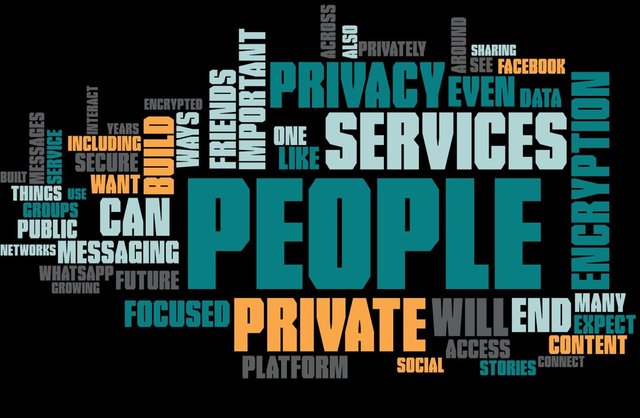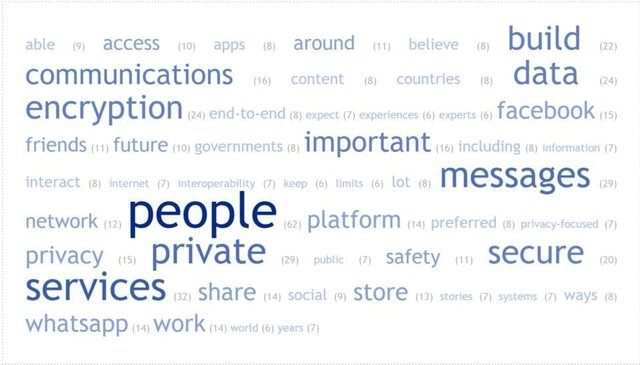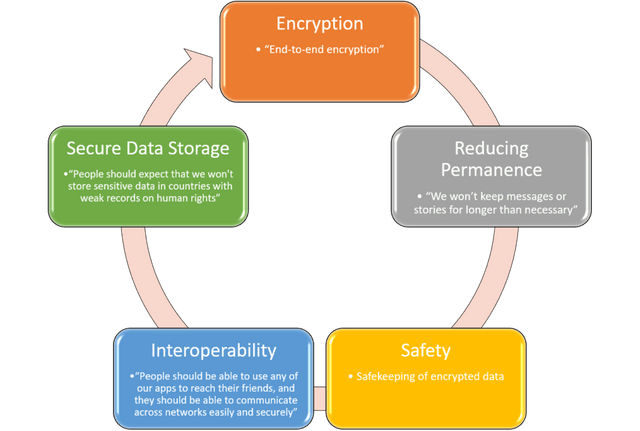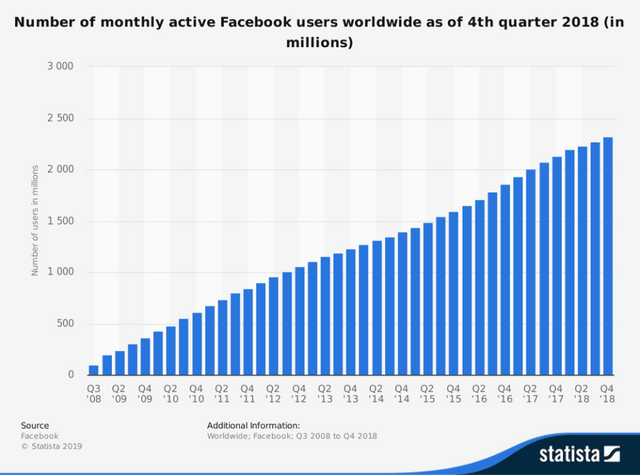
Here is a quick recap of the series of events that sparked the idea for this article:
- Facebook will integrate Facebook, WhatsApp, and Instagram into Facebook Network;
- Facebook is looking to blockchain technology to solve both technological and image problems;
- Likely, Facebook will utilize blockchain technology to secure sensitive data and enable p2p payments;
- It may introduce native cryptocurrency, but it's unlikely to happen before 2020;
Lately, the rumors have been swarming about Facebook adding blockchain technology and even introducing its own cryptocurrency. In relation to this series of events, it remains to be seen if Mr. Zuckerberg provides any validation for the rumors mentioned in his address.
On the surface, everything looks rosy for Facebook: its user base continues to grow, it’s one of the biggest companies in the world by market capitalization, and it's highly profitable. Yet lately, more and more voices have been expressing concern about its future, and the business begins to resemble “Titanic” just before the ship hit the iceberg. Apparently, many of the network's users turned out to be fake accounts, and a recent study discovered that for the first time in history, the usage of the platform has decreased in the U.S.
Much of the backlash faced by Facebook is caused by what public perceives as inadequate treatment of users’ privacy, ultimately culminating in the #DeleteFacebook movement. Mr. Zuckerberg clearly understands that unless the company leadership takes strong measures, it's no longer unfathomable to imagine a world of the future where Facebook joins the rank of Napster, MySpace, and Netscape in the archeological museum of technology.
Zuckerberg’s Vision of the Future
Mr. Zuckerberg's vision is addressed to the three constituencies: people, governments, and experts. The document concerns “building a privacy-focused messaging and social networking platform”. He notices how “Over the last 15 years, Facebook and Instagram have helped people connect with friends, communities, and interests in the digital equivalent of a town square. But people increasingly also want to connect privately in the digital equivalent of the living room”.
Consequently, he believes that in the future, the dominant way of interacting on the “Facebook network” will be through Messenger and WhatsApp. Furthermore, he admits the public may be skeptical of its intentions and capabilities:
I understand that many people don't think Facebook can or would even want to build this kind of privacy-focused platform -- because frankly we don't currently have a strong reputation for building privacy protective services, and we've historically focused on tools for more open sharing,Nevertheless, the Facebook founder argues that the social network has demonstrated that it listens to its users and is willing to introduce the features wanted and requested by the community.
Facebook Network 2.0
Mr. Zuckerberg outlines the five main principles of the future “privacy-focused platform". The following lines are direct quotations from the document:Private interactions. People should have simple, intimate places where they have clear control over who can communicate with them and confidence that no one else can access what they share.
Encryption. People's private communications should be secure. End-to-end encryption prevents anyone -- including us -- from seeing what people share on our services.
Reducing Permanence. People should be comfortable being themselves and should not have to worry about what they share coming back to hurt them later. So, we won't keep messages or stories around for longer than necessary to deliver the service or longer than people want them.
Safety. People should expect that we will do everything we can to keep them safe on our services within the limits of what's possible in an encrypted service.
Interoperability. People should be able to use any of our apps to reach their friends, and they should be able to communicate across networks easily and securely.
Secure data storage. People should expect that we won't store sensitive data in countries with weak records on human rights like privacy and freedom of expression in order to protect data from being improperly accessed.
Blockchain and Cryptocurrency (Word Cloud)
Can we discern anything from Mr. Zuckerberg’s long exposition on the future of blockchain and cryptocurrency within this new Facebook Network?

A Word Cloud of Mark Zuckerberg's EssayThe word “encryption” is used 24 times by the author, the expression “end-to-end encryption” is used eight times; however, perhaps the most telling phrase is “Encryption is decentralizing”. In addition, there are hints that some payment mechanism will be introduced:
“And we all expect to be able to do things like payments privately and securely”, “and then build more ways for people to interact on top of that, including calls, video chats, groups, stories, businesses, payments, commerce, and ultimately a platform for many other kinds of private services”, “You can imagine many simple experiences like this -- a person discovers a business on Instagram and easily transitions to their preferred messaging app for secure payments”, “Beyond that, significant thought needs to go into all of the services we build on top of that foundation -- from how people do payments and financial transactions”.From the word cloud analysis, we can discern other important themes from Mr. Zuckerberg's message: people, private [privacy], secure, future. It's about people's secure and private future.
Crypto Insider has reached to Facebook for comment, and the response was:
Thanks for reaching out. We aren’t commenting on those reports, which are speculative. We’ll be sure to let you know when we have more to share.As it turns out, we can only speculate on these topics. Clearly, there is a plan to integrate some sort of a payment mechanism into this new collective network that will allow making p2p payments privately and securely. It seems like cryptocurrency makes perfect sense for this purpose. If so, will Facebook release its own native coin (Facecoin?) or enable the use of existing cryptocurrencies? Will it be a stablecoin?
It’s impossible to say for certain, as it's very likely that Facebook’s leadership itself doesn’t have certainty when it comes to these issues. Mr. Zuckerberg reiterates throughout the essay that this transition to the “privacy-focused” platform is a long-term initiative, it’s not something that will happen overnight. He also stresses that throughout the journey, Facebook will be “working openly and consulting with experts across society as we develop this”.
It is likely that over the past few months Mr. Zuckerberg has taken time to familiarize himself with the blockchain technology and all the benefits it can harness in terms of privacy and security. However, Facebook is still in the early exploratory stages of this process. There are currently at least twenty open blockchain-related positions within Facebook covering various areas: technical development, finances, marketing, cybersecurity… Clearly, Facebook is not just focused on developing blockchain solutions, but also educating the public on its benefits and how it can potentially make the entire ecosystem better.
If we go back to the five main tenets of Facebook Network 2.0, where would blockchain fit?

Encryption – happens to be one of the main components of cryptography which, in turn, is one of the foundational blocks of the blockchain. Encryption is congruent with blockchain, but one doesn’t need blockchain for encryption.
Reducing Permanence – blockchain is the opposite of this notion. One of the greatest benefits of blockchain technology is permanence and immutability.
Safety – blockchain is virtually unhackable, however, it’s not well-suited for massive data storage.
Interoperability – blockchain can serve as a great “base” layer for the new integrated network that connects the three main services owned by Facebook: Facebook, WhatsApp, and Instagram.
Secure Data Storage – “As we build our infrastructure around the world, we've chosen not to build data centers in countries that have a track record of violating human rights like privacy or freedom of expression. If we build data centers and store sensitive data in these countries, rather than just caching non-sensitive data, it could make it easier for those governments to take people's information.
Upholding this principle may mean that our services will get blocked in some countries, or that we won't be able to enter others anytime soon. That's a tradeoff we're willing to make”.
For instance, recently, Roskomnadzor (Russia’s Internet regulator) has issued a warning to Facebook that unless it complies with the Russian law requiring the personal data of Russian citizens to be stored in Russia, it will be fined. Although Mr. Zuckerberg is stating that Facebook doesn’t mind being blocked in certain countries, perhaps, blockchain could provide the company with a solution that will satisfy everyone.
If Facebook were to utilize a decentralized blockchain (in this case, we define “decentralization” as “significant geographic node dispersion") to store at least the most crucial and sensitive identifying data, then these data would be stored in every country and in no particular country. But this takes to the previously identified issue of permanence.
Will Facebook build its own blockchain with every user serving as a node, will it build on top of one of the main public blockchains such as Ethereum or EOS, a private blockchain like Hyperledger or will it embrace one of the emerging public blockchains that offer enhanced privacy protection?
It seems unlikely that Facebook will build its own blockchain as this would be a huge side project for the company, building on top of Hyperledger will go against the new ethos that the social network is trying to promote. Adopting Ether (if it comes up with scaling solution), EOS or a public chain that offers enhanced privacy seems to be a more logical choice. Prediction is a fruitless exercise, but one prediction I am willing to make – if Facebook issues its own cryptocurrency, it’s not going to happen before 2020 and it’s likely to be a stablecoin.
Conclusion
Although it's not improbable that at some point, Facebook may pull a plug on the entire blockchain initiative or at least seriously curtail it, nevertheless, the fact that this giant is exploring is positive news for the blockchain proponents.
And if at some point, Facebook issues a cryptocurrency of its own or adopts existing ones, it will take the entire industry to a different level. No other entity in the world is capable of introducing cryptocurrency to over two billion people at once. In addition, at this point, it seems much more probable that Facebook will offer blockchain technology and cryptocurrency to its existing massive user base rather than one of the blockchain-based social media platforms becoming a major player in the world of social media in the near future. Facebook's new vision only reinforces the premise that social media is an excellent use-case for the blockchain.
Whatever plans Mr. Zuckerberg may have for Facebook and blockchain technology, the question remains: is it too little, will inertia carry Facebook to its doomsday rendezvous with the iceberg?
Originally posted on Crypto Insider : https://cryptoinsider.com/mark-zuckerberg-encryption-is-decentralizing/

Congratulations @cryptoinsiderhq! You have completed the following achievement on the Steem blockchain and have been rewarded with new badge(s) :
Click here to view your Board
If you no longer want to receive notifications, reply to this comment with the word
STOPTo support your work, I also upvoted your post!
Vote for @Steemitboard as a witness and get one more award and increased upvotes!
Downvoting a post can decrease pending rewards and make it less visible. Common reasons:
Submit